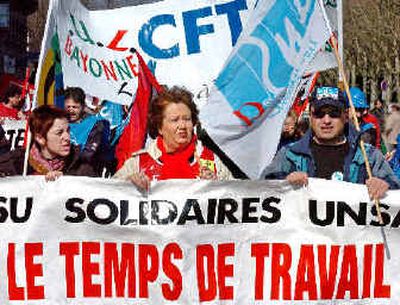Idea just didn’t work

PARIS – Sophie Guilbaud not only holds a full-time job, she also helps run her son’s nursery and treats herself to regular weekdays of shopping, movies and art shows.
The secret to her balancing act is a remarkable piece of social engineering — France’s 35-hour workweek. Introduced under the Socialists but headed for effective abolition by lawmakers today, “les 35 heures” have been a boon for some but, critics argue, a big drain on the economy.
Heated debate over dismantling the working time law has fed into wider political and literary soul-searching in France, on themes ranging from the country’s economic frailty and bureaucratic office culture to whether quality of life should be measured in time or money.
For Guilbaud, a Parisian who works as a loan company manager, that last question is a no-brainer.
“Work is not the only thing in my life,” she said, suggesting she might quit rather than work more hours.
But with unemployment at 10 percent, politicians of all stripes acknowledge that the country’s unique 35-hour law has failed in its original ambition: to force employers to hire massively. What’s more, there are strong signs that it hurt living standards as employers froze salaries to make up for lost labor.
“The intention was to spread work around, but the effect was to spread our salaries around,” Thierry Breton, France’s new finance minister, said last week.
A government-backed bill that effectively restores the previous 39-hour workweek is expected to win final approval this week, despite massive public protests earlier this month and denunciations by the now out-of-power Socialists.
Amid soaring unemployment and stagnating wages, the reform is supported by job seekers and even by factory workers, according to a survey that pollsters CSA published last month – and by 46 percent of the overall population, with 43 percent opposed.
There are other signs that the vision expounded by former Prime Minister Lionel Jospin’s Socialists now rings hollow in some surprisingly left-wing constituencies.
Often touted as the working mother’s godsend, the 35-hour week actually made life harder for poorer women and single parents, according to women’s organization CLEF.
“The women that suffered were the lowest paid, who needed all the overtime they could get to make ends meet,” said CLEF president Monique Halpern.
Marc Touati, chief economist at Paris-based Natexis Banques Populaires, conceded the law initially created some jobs and gave large employers an incentive to offer more flexible schedules because there were tax breaks and business was good.
In today’s uncertain economic environment, though, the shorter workweek is “destroying jobs because companies wonder whether it’s worth taking people on for just 35 hours a week,” Touati said.